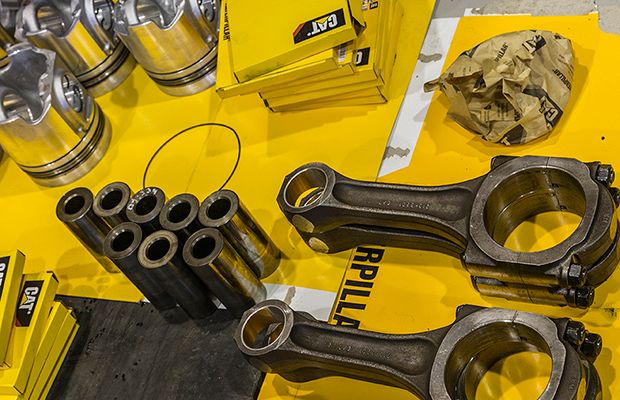Winter work tips
When temperatures freeze, you don’t want your equipment to do the same. Check these items every day when operating your machinery in chilly weather to reduce the risk of equipment downtime.
- Install the correct lubricants. Before it gets too cold outside, install the correct engine, hydraulic, transmission and final drive lubricants for your exact machine and the temperature range it will be working in.
- Condition hydraulic hoses. The outer wrapper of hydraulic hoses can become stiff and crack in colder temperatures. For best results, apply an arctic hydraulic oil for colder months.
- Use block heaters. In most cases, a block heater is the simplest way to fire up your engine in cold weather as it increases the temperatures of the engine and hydraulic fluid. To help speed up the warm-up process, block the radiator to restrict cold air from the fan.
- Keep batteries fully charged and warm. Cold weather requires your batteries to generate nearly twice as many cranking amps in order to turn over, so keep yours charged and warm for easy starting. If you are working in sub-zero temperatures, storing the battery indoors at room temperature when it’s not in use can also help.
- Use starting fluids. Keep all starting fluids at room temperature and inject it only while the engine is cranking. Starting fluids are highly flammable and toxic, so make sure they’re properly stored when not in use. Never store them in the operator’s compartment.
- Very important: Always run the engine until it reaches operating temperature before you begin each day’s work. This helps prevent the intake and exhaust valves from sticking.
- Make sure your tires are properly inflated. Check your tires at the beginning of every shift. As we all know, colder weather can cause them to lose air more quickly. Always inflate your machine’s tires in a heated area.
- Schedule an undercarriage inspection. Before the ground freezes, schedule an undercarriage inspection to help ensure that all components are well lubricated and in good working order to reduce the stress on components and joints.
- Store diesel exhaust fluid (DEF) properly. DEF freezes at prolonged exposure to temperatures of 12°F (-11°C) or lower, so make sure the area you choose to store it in is well-insulated. In addition, DEF does thaw out, so store the fluid in an appropriate container to avoid it bursting during expansion.
- Always fill the fuel tank at the end of a shift. Avoid a frozen fuel tank (and a major headache) in the morning by filling up at the end of each day. Always keep the fuel storage tank clean of water, debris and sediment by draining the water from the water separator daily before refilling the tank.
Need more information about Cat parts and services? Contact your local Cat dealer.

